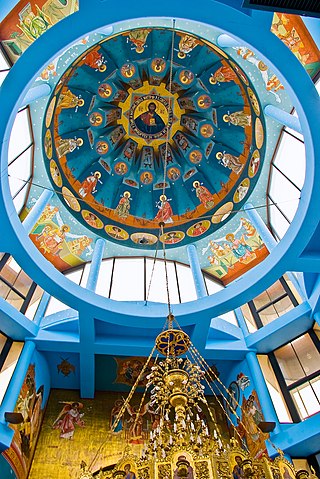
Mit brennender Sorge is an encyclical of Pope Pius XI, issued during the Nazi era on 10 March 1937. Written in German, not the usual Latin, it was smuggled into Germany for fear of censorship and was read from the pulpits of all German Catholic churches on one of the Church's busiest Sundays, Palm Sunday.

Catholic Mariology is the systematic study of the person of Mary, mother of Jesus, and of her place in the Economy of Salvation in Catholic theology. According to the doctrine of the Immaculate Conception taught by the Catholic Church, Mary was conceived and born without sin, hence she is seen as having a singular dignity above the saints, receiving a higher level of veneration than all angelic spirits and blessed souls in heaven. Catholic Mariology thus studies not only her life but also the veneration of her in daily life, prayer, hymns, art, music, and architecture in modern and ancient Christianity throughout the ages.
Mystici Corporis Christi(The Mystical Body of Christ) is an encyclical issued by Pope Pius XII on 29 June 1943 during World War II. Its main topic is the Catholic Church as the Mystical Body of Christ.
Mediator Dei is a papal encyclical issued by Pope Pius XII on 20 November 1947. It was the first encyclical devoted entirely to liturgy.
Anni sacri issued on the twelfth anniversary of his coronation, is an encyclical of Pope Pius XII on a program combating atheism.
Dum maerenti animo is an Apostolic Letter of Pope Pius XII to the faithful in Eastern Europe regarding their persecutions and the persecutions of the Church. "The whole family of Christianity stands in respectful admiration before you, and what you suffer in silence for so long. She prays for God’s mercy. She prays also for those who persecute you."
Ad Sinarum gentem, issued on October 7, 1954, is an encyclical of Pope Pius XII to the Chinese people on the super-nationality of the Church.
Ad Apostolorum principis is an encyclical of Pope Pius XII on Communism and the Church in China. It describes systematic persecutions of bishops, priests, religious and faithful and the attempts of the government to establish a patriotic Catholic Church, independent of Rome.
Evangelii praecones was an encyclical letter of Pope Pius XII about Catholic missions. In it, he described necessary improvements and changes, and the persecution of the Church in some parts of the world. The encyclical was issued in commemoration of the 25th anniversary of the encyclical Rerum ecclesiae by his predecessor Pope Pius XI.
Cupimus imprimis is an apostolic letter of Pope Pius XII to all the faithful in China regarding their persecutions and the persecution of the Catholic Church.
Impensiore caritate is an Apostolic Letter of Pope Pius XII to the persecuted bishops, priests, and faithful of Czechoslovakia.

Fulgens corona is an encyclical by Pope Pius XII, given at St. Peter's, Rome, on 8 September 1953, the Feast of the Nativity of the Blessed Virgin Mary, in the fifteenth year of his Pontificate. The encyclical proclaims a Marian year for 1954, to commemorate the centenary of the definition of the dogma of the Immaculate Conception of the Virgin Mary.

The theology of Pope Pius XII is reflected in his forty-one encyclicals, as well as speeches and nearly 1000 messages, during his almost 20-year pontificate. The encyclicals Mystici corporis and Mediator Dei advanced the understanding of membership and participation in the Catholic Church. The encyclical Divino afflante Spiritu began opening the door to historical-critical biblical studies. But his magisterium was far larger and is difficult to summarize. In numerous speeches Catholic teaching is related to various aspects of life, education, medicine, politics, war and peace, the life of saints, Mary, the mother of God, things eternal and temporal.

The Mariology of the popes is the theological study of the influence that the popes have had on the development, formulation and transformation of the Roman Catholic Church's doctrines and devotions relating to the Blessed Virgin Mary.

A dogma of the Catholic Church is defined as "a truth revealed by God, which the magisterium of the Church declared as binding". The Catechism of the Catholic Church states:
The Church's Magisterium asserts that it exercises the authority it holds from Christ to the fullest extent when it defines dogmas, that is, when it proposes, in a form obliging Catholics to an irrevocable adherence of faith, truths contained in divine Revelation or also when it proposes, in a definitive way, truths having a necessary connection with these.

Le pèlerinage de Lourdes is the only encyclical of Pope Pius XII issued in French. It includes warnings against materialism on the centenary of the apparitions at Lourdes. It was given at Rome, from St. Peter's Basilica, on the feast of the Visitation of the Most Holy Virgin, July 2, 1957, the nineteenth year of his pontificate.
Dilectissima Nobis is an encyclical issued by Pope Pius XI on 3 June 1933, in which he decried persecution of the Church in Spain, citing the expropriation of all Church buildings, episcopal residences, parish houses, seminaries and monasteries. He protested "serious offenses committed against the Divine Majesty, with the numerous violations of His sacrosanct rights and with so many transgressions of His laws, We have sent to heaven fervent prayers asking God to pardon the offenses against Him".

Eastern Catholic victims of Soviet persecutions include bishops and others among the tens of thousands of victims of Soviet persecutions from 1918 to approximately 1980, under the state ideology of Marxist–Leninist atheism.

A number of prayers to Jesus Christ exist within the Roman Catholic tradition. These prayers have diverse origins and forms. Some were attributed to visions of saints, others were handed down by tradition.
Annum sacrum is an encyclical by Pope Leo XIII on the consecration of the whole human race to the Sacred Heart of Jesus. It was delivered in St. Peter's Basilica on 25 May 1899, in the twenty-second year of his pontificate.








